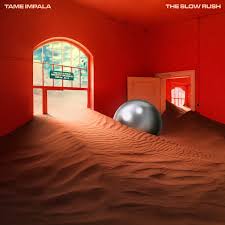GORILLAZ - Plastic Beach
 Thursday, March 18, 2010 at 10:00AM
Thursday, March 18, 2010 at 10:00AM  Damon Albarn's Gorillaz project always seemed like the sort of tossed-off idea that was destined to succumb to the laws of diminishing returns. Conceived as a 'cartoon band' with artist Jamie Hewlett, their debut was a well-done slice of bubblegum-noir hip-hop/pop, but no one was confusing songs like "Clint Eastwood" for more than a bit of fun. That follow-up Demon Days was actually better was a bit of a surprise, but Albarn's prowess as a songwriter and growing success as a collaborator has helped to rationalize this lark's unexpected longevity. There's no natural law to explain away the incredible Plastic Beach, though. Were we wrong about Gorillaz all along?
Damon Albarn's Gorillaz project always seemed like the sort of tossed-off idea that was destined to succumb to the laws of diminishing returns. Conceived as a 'cartoon band' with artist Jamie Hewlett, their debut was a well-done slice of bubblegum-noir hip-hop/pop, but no one was confusing songs like "Clint Eastwood" for more than a bit of fun. That follow-up Demon Days was actually better was a bit of a surprise, but Albarn's prowess as a songwriter and growing success as a collaborator has helped to rationalize this lark's unexpected longevity. There's no natural law to explain away the incredible Plastic Beach, though. Were we wrong about Gorillaz all along?
From a personality whose peak time in Blur revolved around a giant public ego and spotlight-chewing confidence, Albarn has evolved into a secret composer and aural stage director of the highest order. If his Chinese opera Monkey (another terrific collaboration with Hewlett) suggested this metamorphosis was underway, Plastic Beach announces its completion with the best album he has made under any name since Blur's penultimate masterpiece, 13.
It's a record that bears the fruit of a decade spent schooling himself mostly in hiding—behind the cartoons of Gorillaz; within the "nameless" supergroup that made the album The Good, the Bad, and the Queen; buried under a world of archival music with his Honest Jon's label. For what are still very accessible tunes, Plastic Beach is stunningly multilingual and complex. Part of the fun is a guest list that manages to include Lou Reed, Mark E. Smith of The Fall, Paul Simonon, Mick Jones, De La Soul, Super Furry Animal Gruff Rhys, Bobby Womack, the Lebanese Orchestra for Oriental Arabic Music, and Swedish pop group Little Dragon (amongst still more), and the project makes perfect use of all of them. Whether mining Chinese scales, soul, krautrock, electro, psychedelia or hip hop for inspiration, Albarn shifts gears effortlessly. His choices—ones that in the past would betray themselves more obviously as detours—are now never for the sheer shock of something, but are instead always for the enriched interest of the song.
In a recent decade that has seen the indie elite embracing whole chunks of previously unacceptable genres and artists—Timberlake, Lady Gaga, neo-soul, Gwen Stefani, and so on—this record represents an important salvo from the other side to keep the dialogue balanced. A thoroughly uncompromising and esoteric adventure that can still worm its way on to the iPods of a generation for whom even Blur's ubiquitous arena anthem "Song 2" is an unknown quantity, Plastic Beach is one Trojan horse of a pop album.
 Pop/Rock
Pop/Rock 

Reader Comments